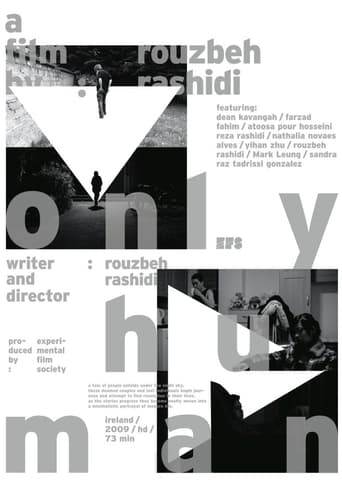Timothy Jones
Men and women, drive, walk and talk, creating an atmosphere of hope and hopefulness underneath a shifting sky in Rouzbeh Rashidi's "Only Human". In this film there are a series of interconnecting moments or perhaps these moments fail to at all. The matter of whether the stories connect is irrelevant; this is tale of a way of life (of lives) and an environment.A group of children meet by a canal. One or two pair off and begin to initiate the awkward routine of 'wooing' or courting the other. The camera is static. It watches observantly; swans gather by the grassy banks and a fog rolls against the sides of buildings and evergreens, as a young couple kiss and talk. The film begins with the youth and their city. The movement progresses nicely with age. Over the period of the film one is shown a young man trying to get in touch with a loved one or friend, a young woman desperately trying to contact what appears to be her lover, an older man driving around try to find some connections, another man existing quietly and disdainfully with his girlfriend, and an indifferent couple sitting together in a flat watching a film. The sense of co-existence and the outcry for connection and a friendship or love seems to be everywhere. These people, walled in by the city buildings and floating down a canal towards black night's sky, are not living some extraordinary lifestyle. These people are not appearing in a monumental moment in their lives. No. These people do this every single night and will drift eventually towards some definite breaking point. This point is never fully disclosed but a sense of doom sets over the city and the lives of these people, this is the calm before the storm; these are days and nights that seem like any other. In the end one could consider the fact the all of these couples are void, they are selfish 'individuals' co-existing. The only true coupling and vision of life one has to take away here, is that of the children at the beginning. With the knowledge that these young people will grow (like the characters in the film as it progresses), fight, hate, and struggle for each other, there is a sense of doom; nothing will be as it was, nothing will be as innocent or as easy as the youth. But the message is not completely condemning, the film offers a blade but also a firm hand to help the viewer out of the ravine. The fact that these individuals 'long' for something, long for a togetherness or a connection or a basic hope of happiness, makes a defiant stand to all of the darker elements. The film "Only Human" shines light on the factors that make people 'human', and the title could be seen as both passive and potentially facetious, but ultimately genuine. There is no sentimentality in any frame of this film; people suffer, people smile uncomfortably and people move on while others cannot. There is on the other hand a sense of 'nostalghia' (an individual's personal reflection on a work, bringing their own history, experiences but also cinematic history and understanding). The film is an observational piece of Art. With "Only Human", one could easily understand that as a work, it dedicates itself to the notion of film as the Seventh Art. With this work as evidence, film is the Seventh Art form, with an incredible potential, and the everyday person is valid subject.
